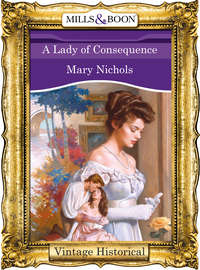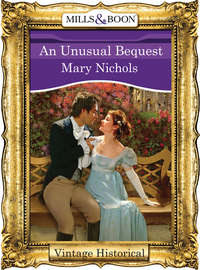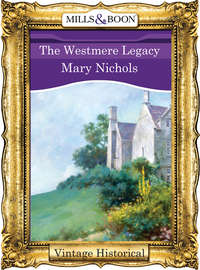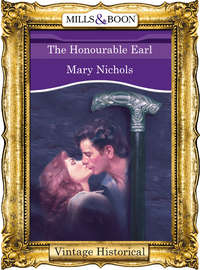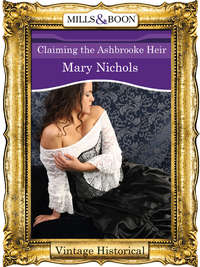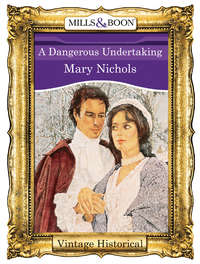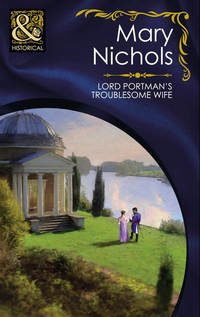
Полная версия
Lady Lavinia's Match

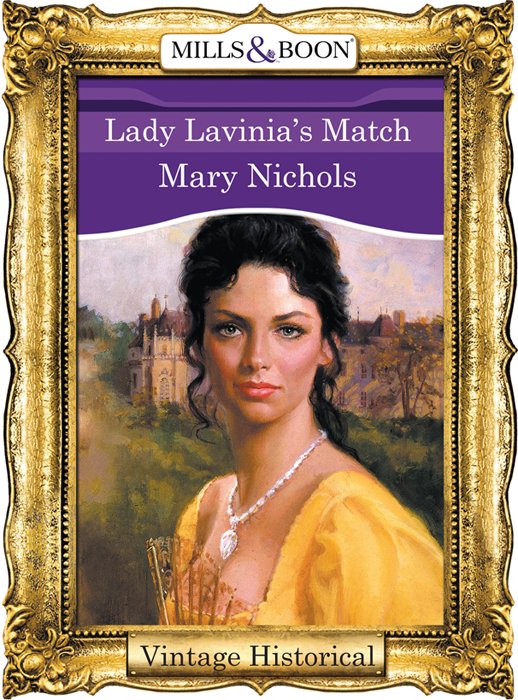
“Oh, James, I knew I could rely on you.”
She grasped both his hands in hers and stood on tiptoe to kiss his cheek. “Thank you.”
“Vinny.” He held on to her hands and raised them one by one to his lips. There was no sign of the bantering, carefree young man who loved to tease. “You shouldn’t thank me. I have brought you nothing but grief.”
“How can you say that? You are my dear—” She stopped and looked up at him. He was waiting for her to continue, but she could not. The word brother stuck in her throat.
He said it for her. “Brother?”
“No. Not brother. Not even stepbrother. That was a game we played to amuse everyone.”
“And the time for games is past,” he said quietly, holding her hands to his chest, where she could feel his heart beating almost as quickly as her own. “You know, I have been waiting for you to grow up….”
MARY NICHOLS,
born in Singapore, came to England when she was three, and has spent most of her life in different parts of East Anglia. She has been a radiographer, school secretary, information officer and industrial editor, as well as a writer. She has three grown-up children and four grandchildren.
Lady
Lavinia’s
Match
Mary Nichols

www.millsandboon.co.uk
Table of Contents
Cover
Excerpt
About the Author
Title Page
Chapter One
Chapter Two
Chapter Three
Chapter Four
Chapter Five
Chapter Six
Chapter Seven
Chapter Eight
Chapter Nine
Chapter Ten
Chapter Eleven
Historical Note
Copyright
Chapter One
1820
The canvas was huge, several feet long and seven high, propped against a wall in the ballroom of Stanmore House, the London mansion of the Duke of Loscoe. Beside it, on the floor, were several pots of paint and, on a table nearby, a selection of brushes, cloths and a jar of water.
Lady Lavinia Stanmore, a huge apron covering her spotted gingham gown and paint brush in hand, stepped back to appraise her handiwork, which was so large that it had to be viewed from a distance to see the whole. It was a rustic, fairy-tale woodland scene with several gnarled old trees, wound about with columbine, giving shade to half a dozen rabbits at play, some colourful toadstools and a bank of wild flowers.
‘Heavens, Lavinia! I know you like the broad view, but this is monumental.’
She turned to face the man who stood nonchalantly leaning against the door frame. James, Earl of Corringham, was dressed to a shade and only managed to escape being a fop by a whisker. His hair was fair and as beautifully cut as his superfine green coat. His biscuit-coloured pantaloons tucked in tasselled Hessians and his precisely tied cravat proclaimed him a Corinthian of the first water.
‘Oh, it’s you, James.’
He grinned, his grey eyes alight with humour. ‘Whom else did you expect?’
‘I didn’t expect anyone in particular.’
He stepped forward to inspect the painting more closely. ‘Where on earth are you going to put it? Where in this house, large though it is, is there enough wall space to hang such a monstrosity?’
‘It is not a monstrosity!’
‘I beg your pardon. I did not mean it is ugly,’ he retracted quickly, knowing her temper could be volatile. ‘I meant monstrous in the sense of very big.’
‘It has to be big. It is a scene.’
‘I can see that.’
‘I mean a scene for a play. It is a backcloth for A Midsummer Night’s Dream.’
‘Oh, I see. Tell me more.’
He only asked her for details because he loved looking at her, loved the sound of her voice, the light of enthusiasm in her green eyes when she talked about things that interested her, the way her chestnut curls lay so lovingly on her slender neck, the way she held herself with a natural grace that had nothing to do with her aristocratic antecedents. He loved everything about her and it was a pity she looked on him as an older brother and not, as every mama of the ton viewed him, an eligible man in need of a wife.
He was not her brother, they were in no way related, except through the fairly recent marriage of his stepmother to her father, the Duke of Loscoe, distant enough to make no difference at all to the way he felt about her, the way he had felt ever since meeting her three years before. She had been a high-spirited, wilful sixteen-year-old, up from the country to sample the delights of London for the first time, not yet come out and far too young to be thinking of marriage. When the Duke had married his stepmother the following year it was easier to treat Vinny as a sister and they had fallen into an easy relationship that he had no idea would be so difficult to change.
‘We are going to put on a play to raise money for Stepmama’s orphanages,’ she explained. ‘The cost of running them is rising all the time and the need for them increasing day by day, and I hit on this way of finding the blunt.’
Homes for children orphaned by the late war were one of the Duchess’s favourite charities. It was that more than anything else which had changed Lavinia’s initial resentment of her to grudging admiration which, when her father declared his intention of marrying Frances, soon turned to love.
She had become more of a mother to her than her own mother had ever been. If it had not been for her brother, her childhood would have been a lonely one. Miss Hastings, her governess, had provided a modicum of education along with lessons in manners, but Lavinia had escaped as often as possible to roam the fields, ride her pony or find mischief with Duncan. It was little wonder she had grown up knowing more of the ways of little boys than young ladies. The only time she saw her mother was when she was sent for to be punished for these misdemeanours and that usually meant being confined to the schoolroom and more isolation. It was almost as if her mother could not bear the sight of her.
‘I suppose it was Little Mama’s idea.’ James’s name for his stepmother had been coined when Frances first came to their home in Essex as his father’s bride, when he was seven years old and she was seventeen. It had stuck even after his father’s death and her subsequent marriage to the Duke.
‘No, it was mine. There was a company of touring players who came to Risley earlier this year. They put up a huge tent and everyone went to see them, so I thought, why not do something like it ourselves? I would have done it at Loscoe Court, but I realised it would not attract a large enough audience, and, as we were coming to London, I decided to have it here. We are going to convert the ballroom into a theatre for one night.’
‘Who is “we”?’
‘Oh, anyone who is interested. You can take part, if you wish.’
‘Can I, now? What makes you think I have any talent as an actor?’
‘We won’t know until we hear you try, will we? And if you are quite, quite hopeless, as I suspect you may be, why, then you may help us behind the scenes…’
‘Shifting the scenery,’ he said, nodding towards the painting.
‘If you like.’
‘And if I don’t choose to do it?’
‘It is of no consequence. There are others who are willing.’
‘Who?’
‘Duncan. Perhaps Benedict Willoughby.’
‘You cannot rely on those two. Your brother is a sloth and young Willoughby is wild and unreliable.’
‘Duncan can rouse himself when he wants to. I thought it might divert him.’
‘From falling into more scrapes? You will only do that if you manage to separate him from Willoughby.’
‘I do not think you should belittle him, James.’ She defended her eighteen-year-old brother out of habit, not because James was not right. ‘I collect you were always in scrapes when you were young. Now you are grown old and staid, you have forgotten what it was like.’
‘Old and staid!’ He laughed. ‘Is that what being seven and twenty is? And I thought I was only now reaching my prime.’
‘You know what I mean.’
‘Do you propose to act in this little entertainment yourself?’
‘Yes, if I am good enough.’
‘Who else?’
‘Lancelot Greatorex.’
‘Lancelot Greatorex? Who is he?’
‘The manager of the Thespian Players and a very fine actor.’
‘That accounts for the preposterous name. I assume it is a pseudonym?’
‘I do not know, do I? I never asked him. The players have other engagements round the country for the next few weeks, but he has promised to come to London at the end of the summer with some of his company to direct us.’
‘Good Lord! Do you mean to say the Duke has countenanced you associating with play actors?’
‘Why should he not?’
‘Oh, Lavinia,’ he sighed. ‘Have you even asked him?’
‘Not yet, but I will.’
He laughed. ‘Then I wish you luck, but forgive me if I am not present when you do. I have no fancy to be at the receiving end of his temper, nor even to witness it.’
‘Papa doesn’t have a temper—not a bad one, that is. He is always prepared to listen.’ And that had come about since he married Frances. Before that he had been a remote and unreachable figure, seen only occasionally, someone who inspired awe rather than love. Not until her mother died and he had brought her to London did she even begin to know him. And that had been a revelation. He was far from the ogre she had always supposed him to be.
‘And having listened, will pronounce judgement and that will be the end of it. His Grace, the Duke of Loscoe, is a benevolent papa who puts up with a great deal more from his daughter than many men would, but that does not mean he will allow you to do as you please.’
‘We shall see,’ she said blithely.
‘Five guineas says he will not hear of it.’
‘Done,’ she said promptly. ‘I will get Stepmama on my side. He can never refuse her anything.’
‘And if he does agree, who do you hope will come to witness the performance?’
‘Everyone. All our friends and no doubt some who are not truly our friends, but I do not care why they attend, so long as they pay for their tickets.’
‘And you think your papa will allow that? And in his ballroom, too.’
‘I don’t see why not. Don’t you remember that ball Stepmama arranged at Corringham House three years ago for that first orphanage in Maiden Lane? The most unlikely people came, some not haut monde at all, and she did not turn anyone away who was prepared to pay the entrance price.’
‘That was before she married your father and it was not the same thing at all. A ball is not a play.’ He paused, watching as she picked up another brush and dipped it in paint to put the finishing touches to a spotted snake shedding its skin. There was no doubt she was a very talented artist, a talent which had been nurtured by their mutual stepmother, herself a highly acclaimed painter.
‘Am I to suppose from that, that you will not be favouring us with your presence?’
‘Oh, I shall come, if only to watch.’
‘And laugh when things go awry, I shouldn’t wonder.’
‘Oh, Vinny, I would never do that.’ He watched her deft strokes, hating to act the devil’s advocate, but he could see her riding for a fall and wanted to prevent it if he could. ‘And there’s another thing that might divert the ton away from your play: the King’s efforts to rid himself of his wife.’
Caroline, after living abroad for the last six years and making herself the subject of notorious gossip, had, on the succession of her husband to the throne, suddenly decided to return to London, expecting to be acknowledged as Queen. Her furious husband ignored her, but she enjoyed the plaudits of a fickle populace, who cheered her to the echo whenever she went out.
‘I know that, but I do believe that will help our cause rather than hinder it. Anyone who is anyone has come to town this summer, either to attend the coronation or view the procession from some vantage point and the Season will go on much longer, considering it is not to be until the first of August. It is why we are here. Nothing would have kept Stepmama away from Loscoe Court and little Freddie unless Papa was obliged to attend.’
‘If there is a coronation. The whole thing is like to turn into a huge farce and make the King look more ridiculous than ever.’
‘So Papa said, but it will make for a very interesting Season, don’t you think?’ she said, with a mischievous smile. ‘Just think of all those people who have not been to town for years and years, all bringing wives and daughters, who will doubtless wish to be amused.’
‘You think they will come to see your play?’
‘I do not see why not. You never know, you might find yourself a bride among them—’
‘Heaven forbid!’
‘Why not? You know it is high time you married.’
‘Oh, Vinny, not you too. It is bad enough having Little Mama giving me jobations over it without you adding to it. I will marry when I am ready. And for love.’
‘No, really?’ She laughed. ‘For love? Who is she? Do tell…’
‘Certainly not. And you have no reason to roast me. I collect you had a Season two years go that cost the Duke a fortune, and you turned away every eligible who so much as hinted he was interested.’
‘It was not fair to encourage them when I had no intention of accepting them, was it?’
‘But why not accept one of them?’
‘For the same reason you have given. I will marry when I am ready.’
‘And when will that be?’
‘When I fall in love.’
‘And how will you know when you are in love?’
It was a question which had occupied Lavinia ever since her come-out, but one she could not satisfactorily answer. Her friends and contemporaries seemed not to be able to answer it either, notwithstanding that many of them were already married, some even with families. ‘I shall know,’ she said airily, rinsing out her brush, then changing the subject abruptly, added, ‘You have not told me why you are here.’
‘Do I need a reason? I heard you had arrived in town and decided to pay a call.’
‘A mere courtesy call, then. I will tell Stepmama you came. She is out shopping.’
‘I wanted to see you too. I have something to show you.’
‘What is it?’ She turned from her work to face him and a spot of paint-stained water flew from her brush, narrowly missing his pantaloons.
He stepped back adroitly. ‘Vinny, put that brush down or you will ruin my clothes and then I shan’t tell you anything.’
She did as she was told while he picked up one of the cloths from the table and bent to clean the watery paint from the toe of his boot.
‘Come on, James, let me see.’
‘Go to the window.’
She hurried across the polished floor to one of a long row of windows that looked out over the street. The road was busy with the usual traffic of carriages and riders going about their business, but immediately below the window was the carriage James had arrived in, its pair of matched horses being held by a young urchin to whom he had given a copper or two. ‘Oh, James, a high-perch phaeton! Have you just bought it?’
‘Yes. Do you like it?’
‘Oh, I must look at it properly.’ She whipped off her apron and hurried from the room, down the grand staircase, across the tiled floor and out of the front door, followed by a smiling James.
‘My goodness,’ she said, stopping beside the phaeton. ‘Those wheels must be at least six feet high.’
‘So they are.’
‘But it is a horrid colour. Yellow and black is far too ostentatious. It’s the colour a newly rich industrialist would choose to flaunt his wealth.’
He laughed. ‘Probably because I bought if from a newly rich industrialist. He turned it over and his wife made him get rid of it, said it was dangerous.’
‘And do you think it is dangerous?’
‘Not in skilful hands. Would you like to come for a ride in it?’
‘Now?’
‘Why not? You can leave that painting for an hour or two, can’t you?’
Lavinia did not hesitate. She was always ready for mischief and the thought of parading in Hyde Park, head and shoulders above everyone else, amused her. ‘I will go and change. Wait for me in the drawing room. Ten minutes, no more.’ She was dashing back up the stairs to her bedroom before she finished speaking, leaving him to amble slowly into the drawing room to wait.
She was back within the stipulated time, dressed in a blue taffeta carriage gown and matching pelisse, her unruly curls tamed under a fetching straw bonnet trimmed with blue ribbons tied beneath her chin. That she should have been chaperoned did not cross her mind, or, if it did, was immediately dismissed on the grounds there was no room for more than two in the carriage; anyway, James was like a brother.
He helped her climb up into her seat, sprang up beside her, flicked the reins and the horses began to trot steadily towards Piccadilly.
‘It’s like being on top of the world,’ she said. ‘Papa had a high-perch once, but he didn’t keep it long. When he married Stepmama and little Freddie came along, he decided it was no longer a suitable conveyance. I only ever rode in it once; he said it was vulgar and unstable and he didn’t know why he had been persuaded into buying it.’
‘Perhaps I should not have asked you to accompany me until we had asked him.’
‘We could not.’ She paused, watching him skilfully negotiate the turn into Piccadilly. ‘He is gone to the Lords and like to be there all day. He is being asked to give his advice over the question of the Queen’s coronation, though I wonder at the haste. The Prince Regent—I mean the King, I keep forgetting—has been married to Caroline and living apart from her for years. Why has he left it until now to do something about her?’
‘Because, in case it has slipped your attention, my sweet, she has arrived back in England expecting to be crowned with him. And he is determined that will never happen.’
‘How is he going to prevent it?’
‘Divorce her, I suppose.’
‘But his behaviour has been every bit as bad as hers. Would he dare risk it?’
‘I suppose he thinks the risk worth taking. If he can divorce her, he might remarry and beget an heir.’
She laughed. ‘But he is too old and fat, surely?’
‘He might not think so. And who else is there? His brothers have not been exactly helpful in the matter of legitimate heirs, have they? Plenty of little Fitzes, but none the law can recognise.’
‘There’s the late Duke of Kent’s baby.’
‘Victoria, yes. But she’s a girl.’
‘So what?’ she said sharply. ‘The only reason women are considered inferior is because men have made them believe they are. And I am not the only one to think that. Stepmama believes it too, as you very well know.’
He laughed as they turned in at the gates of the park and turned along the carriage ride. ‘Vinny, are you looking for an argument?’
‘Not at all, unless you are dying to give me one, in which case—’
‘Argue with you! Never! It is more than my life is worth.’
‘Good, because I want you to let me drive.’
‘Certainly not!’
‘Why not? You know I am as good a whip as any man. All you need to do is hand over the ribbons.’ She reached out and laid her hand upon his, hoping he would relinquish the reins. He felt himself tense at her touch, but brought himself quickly under control.
‘No, Vinny. There are far too many people about and it would not be just you and me who might be hurt if you upset us.’
‘Very well,’ she conceded, knowing he was right. ‘We will come out very early one morning when the park is deserted and you shall let me try.’
‘Your papa would not allow it. Nor Little Mama, either.’
‘Then we will not tell them. Oh, go on, James, it will be fun and what harm can come of it when you are there to look after me?’ She looked up at him, dazzling him with her smile. ‘Will you?’
‘I will think about it. Now, I think you had better acknowledge Lady Willoughby before she reports to your mama that you cut her dead.’
From the height of her seat, Lavinia could look down on the occupants of the other carriage and smiling, she turned and bowed to her ladyship. From then on, she was kept busy bowing and bidding ‘good day’ to dozens of ladies out for an afternoon drive and not a few gentlemen on horseback who knew James and envied him his attractive companion.
There was Lord Bertram Haverley, a widower of middle years, known to be looking for a second wife to give him the heir his first wife had failed to do, though she had provided him with two daughters. Sophia, the older, was not quite of marriageable age, and Eliza was two years younger. They were both pretty, bright girls dressed in white gingham. Soon after parting from them, they stopped to speak to Mr Martin Drew, stiffly correct, who only just managed to conceal his disapproval of her going out unchaperoned; and there was handsome Lord Edmund Wincote, who was a stranger to Lavinia, but greeted James so enthusiastically he was obliged to pull up and present him to her.
He was a young man of perhaps four and twenty, fashionably attired in a riding coat of good Bath cloth, a yellow waistcoat, deerskin breeches and tasselled boots. When he swept off his tall riding hat to Lavinia, he revealed short dark hair that sprang into tight little curls.
‘I am happy to make your acquaintance, my lady,’ he said, appraising her with eyes so dark they were almost black. ‘Are you in town for the Season?’
‘Yes, my lord. And you?’
‘Oh, most assuredly, London is the place to be at this moment.’
‘Oh, you mean because of the coronation?’
‘Not at all.’ He smiled into her eyes, making her stomach give a sudden lurch. ‘Because Lady Lavinia Stanmore is here.’
She laughed a little shakily. ‘Flatterer!’
‘I speak from the heart, my lady. I hope to have the pleasure of meeting you at some of the entertainments being held this year.’
‘Oh, undoubtedly, should we both be invited to the same function,’ she said airily, pretending to be unaffected.
‘Then I shall look forward to them all the more.’ He smiled and replaced his hat before wheeling his horse round. ‘Until we meet again, my lady. Corringham, good afternoon.’
‘That was pitched too bold by far,’ James said, as they pulled away and made for home. ‘He must be desperate.’
‘What do you mean, desperate?’ she snapped, turning on him, green eyes flashing. ‘Am I such a poor catch? A ninny no man could possibly want unless he be desperate? You may be my brother, but that does not mean you may disparage me—’
‘Vinny, that is the last thing, the very last thing, I would do. It is the man I disparage, not you. And I am not your brother.’
‘Thank goodness for that for, if you were, you would wrap me up in so many prohibitions I should not be able to breathe. Good heavens, the man was only being polite.’
‘I am sorry, Vinny,’ he said. ‘I did not mean to upset you. You are miles above him in every way and, by desperate, I meant he was trying to find favour even when he must know he has no hope.’
‘And how do you know he has no hope? He is handsome and very polite and—’
‘But for all we know he might be a fortune-hunter, looking for a rich wife and they don’t come richer than the daughter of the Duke of Loscoe.’


